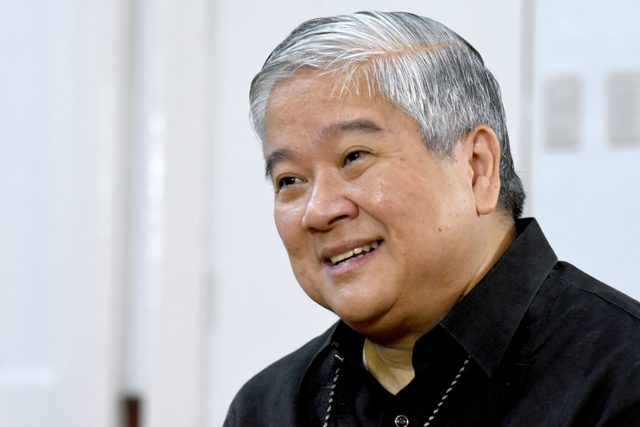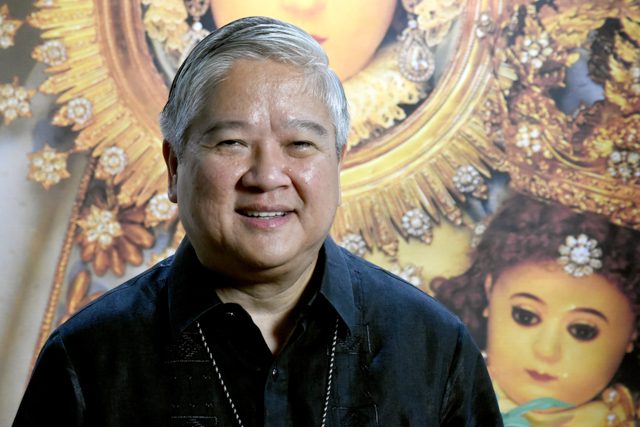SUMMARY
This is AI generated summarization, which may have errors. For context, always refer to the full article.

MANILA, Philippines – “Hashtag blessed” was how Archbishop Socrates Villegas, protégé of the late Manila Archbishop Jaime Cardinal Sin, described his 4 years as president of the Catholic Bishops’ Conference of the Philippines (CBCP).
“Bawat araw nu’ng 4 years na ‘yun ay blessing galing sa Diyos, kasi malaking pagkakataon, malaking biyaya sa Diyos, na mapaglingkuran ‘yung Simbahan sa ganoong pamamaraan,” Villegas said.
(Every day of those 4 years was a blessing from God, because it was a big opportunity, a huge grace from God, to serve the Church in that way.)
Rappler sat down with Villegas on Friday, December 1, a day after he ended his term as CBCP president. In this Rappler Talk interview, Villegas talked about his 4 “blessed” years as CBCP president – that sometimes brought him to tears.
The archbishop, after all, became a whipping boy of critics of the Catholic Church. He was also a frequent target of fake news.
In the face of criticism, Villegas admitted he sometimes cries before the Blessed Sacrament, “because it really hurts.”
Villegas said he takes comfort in the words of his father confessor, who compares prayer life to oil.
“Ang langis, madulas. At kung totoong nagdadasal ka, at parang meron kang coat ng langis sa iyong buong pagkatao, huwag mong papabayaan na ‘yung papuri ng tao dumikit sa ‘yo. Hayaan mong dumulas,” Villegas quoted his confessor as saying.
(Oil is slippery. And if you really pray, and you have a coat of oil on your whole being, do not let the praises of people stick to you. Let them slip away.)
“Huwag mo ring pababayaan na ‘yung paninira, masasakit na salita, ay dumikit sa ‘yo. Hayaan mo ring dumulas. Kasi sa huli, hindi naman ‘yung sinasabi ng tao ang mahalaga sa atin. Sa huli, kung ano ‘yung sinasabi ng Diyos,” he continued.
(And do not allow the demolition jobs and hurtful words to stick to you. Let them slip away, too. Because in the end, it’s not what people say about us that’s important. In the end, it is what God tells us.)
Not sparing Aquino, Duterte
The attacks against Villegas stem from the way he spared no one from criticism.
Despite his friendship with the Aquino family, Villegas as CBCP head questioned the controversial Disbursement Acceleration Program (DAP) under then president Benigno Aquino III.
He also rejected the Reproductive Health Law signed by Aquino.
After Aquino’s term, Villegas as CBCP head slammed the killings in President Rodrigo Duterte’s war on drugs.
“Mas malaki ang pananagutan ko sa Diyos kapag hindi ako nakialam,” Villegas explained. (I have a bigger accountability to God if I do not get involved.)
He said the mandate of God, after all, is to bring the Gospel to the whole world, not only within the 4 walls of a physical church.
He said this means the “light of the Gospel” should enter economics, politics, culture, and other human endeavors.
“Kapag hindi ko pinasok ‘yun, at kapag ako’y mamatay, baka tanungin ako ng Panginoon, ‘Pinagkatiwala ko ‘yung Gospel ko sa ‘yo. Bakit mo ginano’n, bakit mo ‘tinago?'” he said.
(If I do not enter those, and when I die, the Lord might ask me, “I entrusted the Gospel to you. Why did you do that, why did you hide it?”)
‘Godless politics a curse’
On the separation of Church and state, Villegas said the Catholic Church itself believes in this principle.
The Catholic Church, he said, cannot partake of civil power. In fact, a priest who runs for public office receives “disciplinary action” from the Catholic Church.
At the same time, Villegas said, “There is separation of Church and state, pero kahit bali-baliktarin mo ang batas ng Pilipinas (but even if you turn Philippine law upside down), there is no separation between God and man.”
He added, “Godless politics is a curse for the people.”
Villegas, however, said the CBCP is not all about criticism.
What they do, he said, is “critical collaboration.” Villegas said this means supporting the government when it is doing something right, and correcting it when it is doing something wrong.
“Sana narinig ninyo, narinig nila, na sinabi ko rin, na ‘yung pro-poor na posisyon ng ating Presidente ay pro-poor na posisyon ng Simbahan; na ‘yung kanyang pagiging mapagmalasakit sa mahihirap, ‘yun ay malapit sa puso ng mga obispo, at malapit sa puso ko,” Villegas said.
(I hope you also heard that I said the pro-poor position of our President is the pro-poor position of the Church; that his compassion for the poor is close to the hearts of bishops, and close to my heart.)
He also once sent word to the government that transferring the anti-drug campaign from the Philippine National Police to the Philippine Drug Enforcement Agency was a step “in the right direction.”
“Hindi naman ako palaging nagki-criticize. At hindi naman kami talaga kritiko. Kami ay partner. Kami ay partner para sa kapakanan ng taumbayan,” he said. (I do not always criticize. And we are not really critics. We are partners, for the welfare of our people.)
“At huwag sana kaming tingnan bilang opposition,” he added. (And I hope they don’t view us as the opposition.)

‘Magkita-kita na lang tayo sa Last Judgment’
More than 3 decades since he was tapped as private secretary of Cardinal Sin, Villegas still takes his cue from his spiritual father.
Villegas remembers the times when Sin was much criticized and was, in Villegas’ words, a victim of “fake news.” Sin would only advise Villegas to pray for the cardinal’s critics, but not waste their time defending the cardinal.
Recounting a lesson from Sin, Villegas said: “We have nothing to protect. And we have nothing to defend, we have nothing to prove.”
“Wala tayong dapat patunayan kasi Diyos lang talaga ang nakakaalam ng lahat,” he said. (We have nothing to prove because only God really knows everything.)
Toward the end of our interview, I also asked Villegas about a criticism hurled against him – that he is trying to be a Cardinal Sin.
To critics who say this, Villegas said, “Magkita-kita na lang tayo sa Last Judgment. At alam ko hindi ‘yan ang aking intensyon. Alam ng Diyos na hindi rin ‘yan ang aking intensyon.”
(Let us see each other during the Last Judgment. And I know that is not my intention. God also knows that is not my intention. Let us see each other there.)
‘Hindi tayo malayo sa Panginoon’
We ended our interview with his thoughts on the Filipino soul. By 2021, the Philippines will mark the 500th year since Christianity reached our shores. How does he feel that many Filipinos still have skewed moral values?
Villegas pointed out a disconnect between the “feelings” and the “actions” of the Filipino Christian.
“Sa larangan ng feelings, talagang feel na feel natin ang pagiging Katoliko (In the aspect of feelings, we really feel being Catholic),” he said, citing Catholic devotions like the Nazareno procession.
“‘Yung feeling, dapat lumabas sa buhay, at pamumuhay. Doon tayo medyo nagkukulang,” he said. (Those feelings should come out in life, and how we live our lives. That is where we have shortcomings.)
Despite this, Villegas said he is not disappointed. The Catholic Church, he said, just needs “constant reforms.”
“Hindi tayo malayo sa Panginoon. At alam ng Panginoon na malapit ang Pilipinas sa kanya.” (We’re not far from the Lord. And the Lord knows that the Philippines is close to him.) – Rappler.com
Add a comment
How does this make you feel?
There are no comments yet. Add your comment to start the conversation.